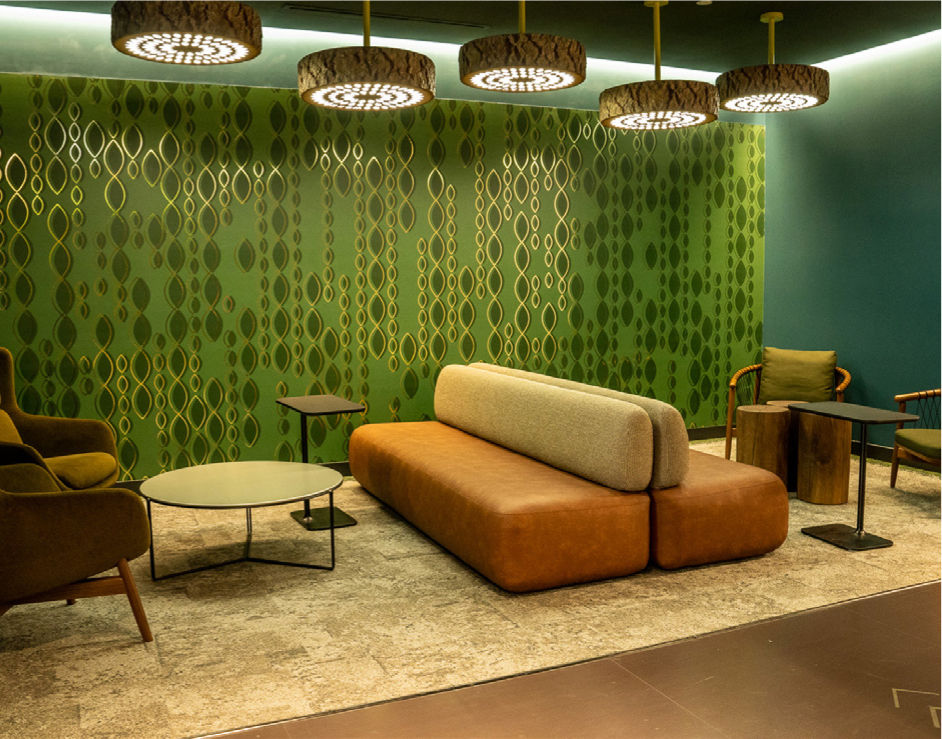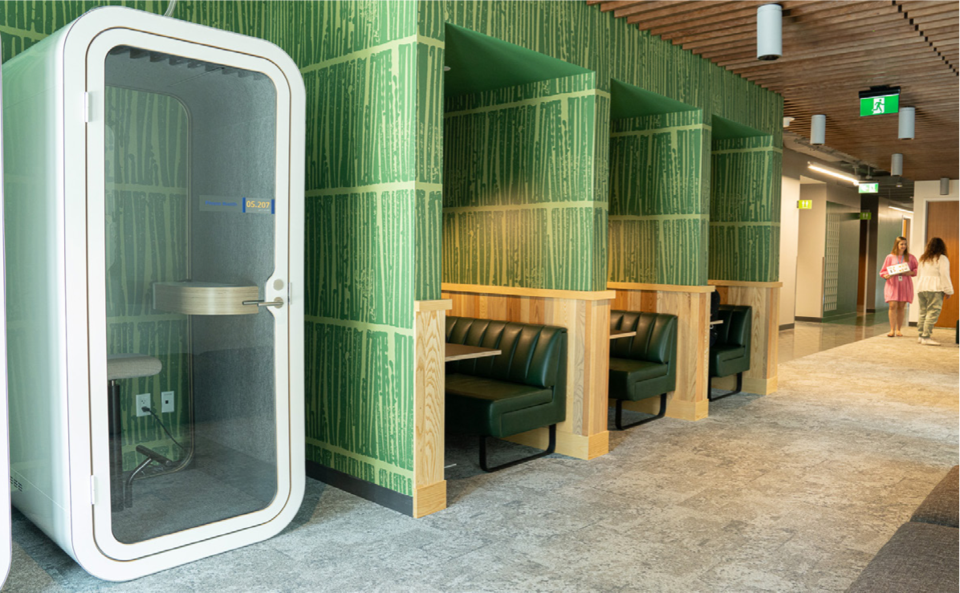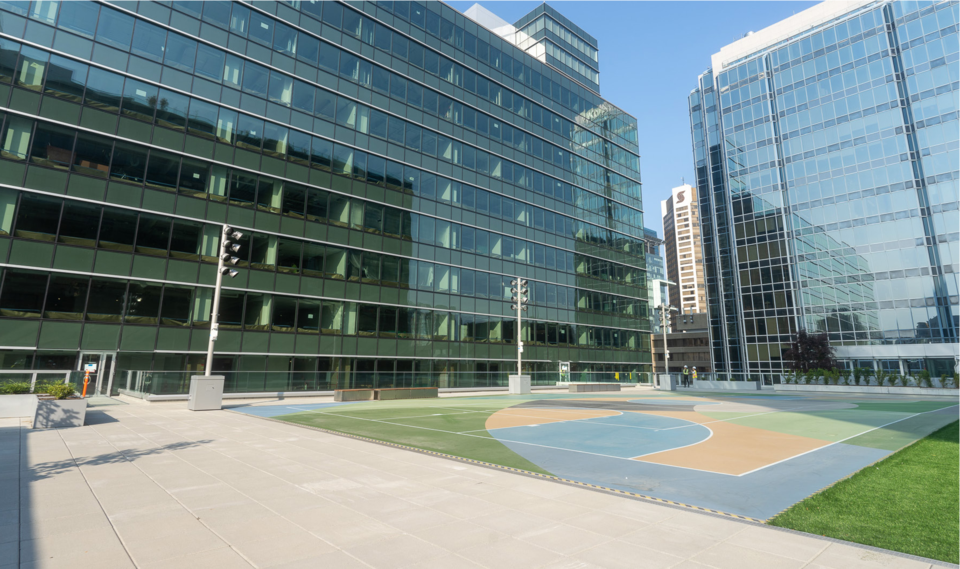They’re not Googleplex or Apple Park, but Vancouver’s tech campuses and innovation hubs continue to attract investment and talent while supporting the area’s technology sector and the local economy, according to companies that occupy and build them.
Tech campuses are typically sprawling complexes that house offices, research labs and other facilities. Designed to foster innovation, collaboration, research and development, and productivity in workspaces, these hubs are known for providing unique amenities to attract top talent and investment. While remote work and distributed teams are common following the COVID-19 pandemic, these campuses continue to offer in-person experiences.
Amazon’s Vancouver Tech Hub covers space in five downtown office buildings—including 402 Dunsmuir and the Telus Garden building—where more than 4,500 corporate employees collaborate, mainly in tech, sales and marketing positions. The hub’s centre of gravity is now the new development The Post, where Amazon recently became the sole corporate tenant, occupying 21 floors and nearly 500,000 square feet in the South Tower. An example of Vancouver’s mid-century architecture, The Post is located on the site of Canada Post’s former Georgia Street processing facility. The building’s developer and manager, QuadReal Property Group, and MCMP Architects retained and restored many of the building’s distinctive elements.
Amazon Canada’s head of human resources Michael Weeks says the big focus at The Post is on collaboration.
“We try to create a space that fosters energy and brings vibrancy to the environment,” says Weeks. “We’ve set up our space around team neighbourhoods. They either work at their desks or in collaborative spaces and use white boards and the social setting of an in-person presence.”
When the development is fully complete, it will add nearly 1.1 million square feet of office space and 185,000 square feet of retail space over a full city block—making it the largest office building in Vancouver. Amazon plans to also later occupy the North Tower, which is currently under construction.
Besides fully equipped kitchens on every floor, games rooms, lactation spaces for nursing moms, and interfaith and quiet rooms, the South Tower features special amenity floors for Amazon staff on the upper levels, including a solarium, and team suites for brainstorming. The building has a rooftop deck with dog parks to support Amazon’s Dogs at Work program. Other amenities include an outdoor sport court for basketball and volleyball, outdoor seating, a dog run and a catering space for outdoor events scheduled to open in the summer of 2024.
“We want to make the space welcoming and inclusive for an increasingly diverse workforce,” says Weeks.
A company volunteer group organizes events such as trivia days, ping pong competitions and World Cup soccer pools.
“Our staff are in charge of their own schedule, so they’ll schedule time to have a ping pong match,” Weeks explains. “Our employees prioritize balance and fun and that’s part of the value of being in person and having a social network.”

Offering shared amenities allows employees to build relationships and improves collaboration, according to Weeks, and while Amazon offers hybrid work options, the company’s downtown office spaces are attracting staff.
“Amenities can provide a bit of balance. We think teams form better when they are socially connected, not just focused on work all the time,” he says. “The pandemic has changed our relationship with employees. Flexibility right now is front of mind, and it needs to be. A one-size-fits-all solution for everything related to employees—be it time in the office, how they work or where they work—it’s kind of a thing of the past.”
The downtown location of Amazon’s corporate offices also benefits the local economy and surrounding businesses, according to Weeks. Loblaws City Market and Starbucks are open for business at The Post, and a food court is expected to open later this year.
Planning for the future
Adding to its existing properties along Great Northern Way in Vancouver, Low Tide Properties has partnered with PCI Developments on the South Flats project—a planned innovation hub near the future Great Northern Way-Emily Carr and VCC-Clark Skytrain stations. Located at 485 Great Northern Way, the development includes three mixed-use high-rise towers with 2.2 million square feet of space with 1,400 rental residential units, 900,000 square feet of office space and 200,000 square feet of retail, industrial and service commercial space. Once completed, it will offer shared amenities such as an indoor market area and outdoor rooftop space.
“The creative hub on Great Northern Way is still very much in its early stages,” says Adam Mitchell, Low Tide’s vice-president of asset management and development. “The projects themselves are in the rezoning process with the City of Vancouver and will take a few years to deliver to market.”
The first phase of buildings is projected to be ready in 2027, following the launch of the Broadway Subway.
“Our goal is to create a vibrant, complete community which leverages the area’s existing strengths, like the post-secondary institutions and a multi-modal transit network connected to the broader city, by adding apartment, retail, industrial and office space that will make Great Northern Way the local home and global champion for Vancouver’s creative innovation economy,” Mitchell explains.
Despite the pandemic and the high cost of rented office space, Mitchell says he believes there is still appetite among companies to invest in large office spaces.
“Right now, the focus of these companies is on the premier office buildings in the market which haven’t seen meaningful availability in 10-plus years,” he says. “Through a combination of vacancy or sub-lease opportunities, companies have access to space they otherwise wouldn’t have.”

Overall, Mitchell says he’s noticed increased emphasis on providing meaningful user experiences for employees in post-pandemic office space. Integrating residential rental and retail with office or industrial space is critical for what Mitchell calls “creating vibrancy 24/7” to allow people to interact and connect socially.
“When people are moving from a solitary setting like working from home to a more social setting in a shared space, it often is out of the desire for more social connections,” he explains. “It’s not just what is happening in the office space that matters. It’s just as important to think about what is happening on the ground level of the buildings and surrounding areas.”
While the Vancouver-based company can’t yet confirm which businesses will operate out of the development, Mitchell says he’s anticipating “strong interest” once the construction timeline is set.
“We are talking with and educating interested groups on the vision for the area and the reception has been very positive,” he says. “The Broadway Corridor sub-market continues to have the lowest office vacancy in Vancouver, indicating that the technology, creative and life science tenants that favour this area still see office space as a meaningful part of their strategy."
This article was originally published in Office Space Magazine.




